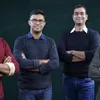WATCH: How this Hyderabad startup is looking beyond mainstream education to target those on ‘top of the pyramid’
Experiential learning startup Worldview Education is plugging the gap in mainstream education through transformative learning experiences. In a video interview with YourStory, Founder Sampreeth Reddy explains how.
Marks sheets are passé. Nowadays, students and even first-time job seekers are tested over a multitude of factors other than their academic prowess and a shiny report card.
Qualities and characteristics like leadership, problem-solving attitude, innovation, communication skills, team work, thinking and creativity, and planning and organisation also matter. And oddly enough, these attributes cannot be nurtured through textbooks alone. It requires real-life problems and exposure to real challenges to harness such qualities right from the grassroot level.
And encouraging students with such experiential learning is Worldview Education, a person-centric experiential learning platform for students.
Launched in 2010 by Sampreeth Reddy (34), it aims to empower the youth through transformative learning experiences.
The Hyderabad-based startup claims to have delivered meaningful learning experiences to over 30,000 students from across 400 plus schools in India, parts of South Asia, and the Middle East.
How it started
During his college year, Sampreeth was a part of the global youth organisation AIESEC, which eventually became the catalyst for Sampreeth’s very own entrepreneurial story.
“Throughout our college days, we would spend a lot of time with this organisation, which would take us across the world. We got to understand different cultures, different global perspectives, and the different challenges that existed in the world,” he says.
“We thought why not build a platform for young people to immerse themselves in similar real world challenges and real world situations, rather than only look at what they are learning from an academic perspective,” explains the founder.
1563282267661.png?fm=png&auto=format)
Sampreeth Reddy, Founder Worldview Education
Solving problems, one Gen Z at a time
With programmes designed for middle and high-school students, the platform basically aims to engage students in pressing global issues that are also relevant in the local context. These could include anything - from lessons on environmental conservation to sustainable urbanisation, global citizenship, and healthcare. As long it helps students be actively involved in various activities that take them outside the controlled classroom environment, which is an essential attribute of experiential learning.
“Experience has to come before the learning,” Sampreeth quips.
According to him, experiential learning is an age-old idea, which is kind of reinventing itself in the current context. “In today’s avatar,” he says, “it’s a whole lot of things. But for us, it’s about experiencing something yourself and then through deep introspection and reflection processes, consolidating what you have learnt from that experience.”
1563282442839.png?fm=png&auto=format)
Nature Turks programme of Worldview Education
In order to operationalise this model, over the last ten years, Worldview Education has been working with schools that not only serve as aggregators for the platform, but also provide them with infrastructure to facilitate community engagement on a grand scale.
Sampreeth says, post working hours, these educational institutes could double up as urban farms, urban forests, energy producer/provider, healthcare centres, or even as sports centres.
The biggest challenge, however, is making all of this happen and the startup is doing this step by step, one Gen Z student at a time.
He says, “These students have tremendous influence on their families and in their schools to do things even as they are learning. We are looking at them as solvers first, and then the profession or the function they are dealing with. So you could be a lawyer but you could also be a water conservationist, or you could be a doctor but also a fitness expert. In many ways, we are asking them to re-imagine the entire jobs and livelihood landscape from a solving point of view.”
Filling the gap
For Worldview, the target audience is more closely related to the demography than the geography. As Sampreeth explains, there is no shortage of aspiration or affordability in Tier-II and Tier-III cities. The only thing that students in these areas lack is access – a gap that the team of Worldview strives to fill in.
“We have seen schools join us from Tier-III towns and do phenomenally well in these programmes and even take forward very interesting projects… it goes on from Davanagere and Erode, to Agra and Kanpur. We have, so far, had schools from across 80 different cities,” he says.
In the past ten years, Worldview has worked closely with around 30,000 students from about 400-plus schools. Moving ahead, Sampreeth hopes that this number increases exponentially as the team strategically targets not only the students but also the families at the top of the chain to make an impact.
“We want take this number (of schools) to be a thousand in the next three years. It’s a strategic mission for us. If we can engage the 1.5 million students who are part of these thousand top schools across India, then we would essentially be engaging 1.5 million families, who are economically at the top of the pyramid, in all these problems which they can choose to solve themselves,” Sampreeth adds.
(Edited by Megha Reddy)


1563282267661.png?mode=crop&crop=faces&ar=2%3A1&format=auto&w=1920&q=75)

1562506112828.png?fm=png&auto=format&h=100&w=100&crop=entropy&fit=crop)





